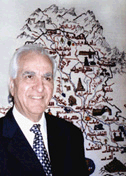Uncertain location on the international tourist map
What's happening with Islamic Tourism? Where exactly is it on the international tourist map? This question has been bothering me in recent days and I keep trying to find an answer. The last three years have been years of hard work: Ten issues of Islamic Tourism magazine have been published, and a website, which is updated weekly with the latest news, has been established, we have attended international tourism exhibitions in Europe, Arab and Islamic countries, distributed the magazine, met influential personalities in the tourism sector, invested heavily in the latest computer technology, and enlisted the efforts of many talented English and Arab journalists.
But we still have to ask the same question: What's happening with Islamic tourism?
Where is its place on the world map of tourism? Is every person in charge of tourism aware of the concept and is it seen as a viable project worthy of serious thought?
What is meant by this question? Is there a place in the media world for an Islamic Tourism magazine and website? Or should it be developing in tandem with tourism world-wide?
The first question is easy to answer. The magazine and its website speak for themselves. They are developing and evolving every day, be it through the home page on the web site, the country profiles or the varied, in-depth articles in the magazine. Our representatives have participated in most international tourist events and conferences and provided detailed reports for our readers. Islamic Tourism, as a magazine and a website, has become well known in Arab, Islamic and international circles. We are confident about our magazine and its future.
The problem is with the other part of the question. The presence of Islamic Tourism at international tourism events is a major achievement, considering the nature of world tourism, the international security situation and the media's preoccupation in equating Islam with terrorism. Thousands of questions have now been raised about Islamic Tourism and the new dimensions it has opened at the upper end of the travel market with new destinations sought after by the movers and shakers in the industry who are working to develop and expand their businesses.
The question is not related to the magazine but to the project of Islamic Tourism. Is it capable of competing in a world market saturated with progammes and projects? It is a great shame that the promoters of Islamic Tourism are largely absent from the international arena and hardly ever show up at important exhibitions held in major capitals throughout the world on a regular basis. These exhibitions are no strangers to weird and wonderful ventures - some without any ethical or religious basis.
"We are confident that if the concerned parties are not going to promote Islamic Tourism in an organised and developed way, the international companies will step in and take advantage of a lucrative market. International banks are already providing Islamic banking facilities and large companies with several departments work in the field of marketing Halal meat and other Islamic products, especially developed for a specialist market.
Islamic Tourism caters to the needs of millions of Muslims around the globe performing Haj or Umrah and visiting the holy cities of Mecca and Medina and the holy shrines in Iraq, including Najaf and Kerbala. Yet it is lagging behind international tourism with no clear programmes or promotion through the internet or other media.
It has to move from individual endeavours to joint, co-ordinated activities. It is imperative for people working in the Islamic Tourism sector to consider and answer the following questions:
1. Where is its place on the world map of tourism?
2. Where are the programmes and organised products of Islamic Tourism that respond to the needs of millions of Muslims world wide, to be promoted in tourist exhibitions and then carried over
to tourism companies and travel agents?
3. Where are the tourism products that follow from our traditions, beliefs and customs?
4. Where are the companies, travel agents and organisers of Haj, Umrah and tours of the holy shrines world wide? Why aren't they advertising their tours, participating in international exhibitions and promoting their companies through the media?
5. Why can’t ministers of tourism and those in positions of authority play an active role in helping those who are working for the promotion of Islamic Tourism and various programmes in international exhibitions instead of turning up with replicas of existing programmes.
Travel agents in Western and developed countries have numerous brochures for "package deals". The trip is normally organised over several days or weeks, and the tourist knows exactly what he is going to get and whether the programme will meet his needs. These programmes are presented to the public in beautiful leaflets and brochures distributed freely in travel agencies and at international exhibitions.
Compare all this with what we find in the Muslim world. Islamic Tourism agencies present their products badly and do not care about local and international promotion. They do not provide a strict timetable for their tours or, if they do, it is not adhered to.
There are Haj and Umrah agencies but they work on a small scale, as individuals. Their activities not well organised and limited in their cultural and religious benefits.
Therefore it is necessary to provide Islamic Tourism programmes together with informed guides who know the geography and history of tourist sites and who are capable of communicating in foreign languages. These programmes should be well advertised through the internet and at international exhibitions.
We are confident that if the concerned parties are not going to promote Islamic Tourism in an organised and developed way, the international companies will step in and take advantage of a lucrative market. International banks are already providing Islamic banking facilities and large companies with several departments work in the field of marketing Halal meat and other Islamic products, especially developed for a specialist market.
You may ask how do we proceed in the present climate when terrorism is universally condemned and the media continues to highlight atrocities and portray Muslims and Islam as purveyors of terrorism. The terrorists try to paralyse everyday life, but life goes on despite every thing. Governments should take all
possible measures to prevent suicide attacks like those in Kerbala during Ashura, and in Spain.
But these measures should not paralyse travel and tourism between countries, especially neighbours. Countries should not prevent their citizens from visiting certain states which are perceived as hostile and they should not tighten visa requirements and impose restrictions that limit travel between countries with mutual interests, including tourism. Governments have to follow the examples of their citiziens who have carried on with their lives regardless of the dangers and calamities. They have to refrain from imposing harsh rules, and abrogate unnecessary restrictions which may have already been imposed, to allow nations to live together despite the actions of
outlaws from inside or outside. Lets encourage governments to compete in attracting the highest number of visitors.
Finally in response to the questions raised at the beginning of this article, we would like to stress that Islamic Tourism magazine and its website, are ready and able to provide support in formulating programmes for Islamic Tourism along the lines discussed. So get in touch with us about your products and programmes and exhibiting them in the international market through international exhibitions, tourist agencies and travel agents throughout the globe.
May Allah guide us to the best of deeds.
A. S. Shakiry
|

